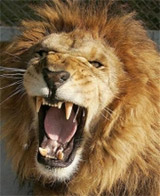Why not take the lion's mane man?
A simple solution to the question of why some male lions do not have manes, or just have a few hairs around their necks: that is because they are trying to cool down.
Many theories have been put forward about the evolutionary purpose of the dense mane that always accompanies "the lord of the forest". Some scientists have surmised that they were born to appeal to their children, while protecting the lion's neck against the bouts of rival love.
But researchers at Field History Museum, Chicago (USA) said the mane or thin mane lions in Tsavo nature reserve, Kenya still gained the attention of her group.
 (Photo: Reuters) When comparing lions living in the hot, wet Tsavo sanctuary with colder and colder people in the Serengeti plains, the researchers found that the male lions in Tsavo had something mane is smaller than their kind.
(Photo: Reuters) When comparing lions living in the hot, wet Tsavo sanctuary with colder and colder people in the Serengeti plains, the researchers found that the male lions in Tsavo had something mane is smaller than their kind.
Some researchers have speculated that Tsavo lions have more testosterone in their bodies - explaining their unusual aggressiveness and poor mane - like this hormone that has been done for men. he bald his head.
Others explain that they may have inherited this trait from extinct European lions, whose images in the cave show a mane-free head.
There is also a theory that untreated lions in the forest prohibit Tsavo because they are malnourished, dehydrated, or torn when crept through bushes or under thorns.
Song, Thomas Gnoske and Kerbis Peterhans from the Field Museum rejected these hypotheses.
They said the males they observed in Tsavo also had manes, but grew late and grew slower, and were thinner than their congeners in Serengeti.
The small manes of Tsavo's lion did not seem to affect their mating ability, the team said. Observing that the lions lack this majestic wing is still the leader in the herd.
"We think all lions grow manes suitable to their local climate conditions," the authors write. "At some point, cooling takes precedence over other evolutionary benefits."
T. An
- The strange lion had a thick mane covering his stomach
- Video: A close-up of the horrifying battle of lions
- Crocodiles are torn by lions because they dare to loot their lures
- Not only rhinos and tigers, African lions will soon disappear
- Strange 18-year-old female lion grows mane like a male
- Discover interesting luscious lion mane mushroom
- Bloody hippos with lions
- Sea lions kill, eat baby meat that makes experts confused
- Shocking discovery about the little-known lion
- Reviving a lion from a corpse intact for 12,000 years
- Why do lions prefer to hunt porcupines whether they can be hurt or die of porcupine?
- Lions are disappearing in West Africa
 Animal 'suffering' after hibernation
Animal 'suffering' after hibernation Why do goats climb well?
Why do goats climb well? Scientists were surprised to see chimpanzees eating turtles
Scientists were surprised to see chimpanzees eating turtles Giant catfish died deadly due to drought in Thailand
Giant catfish died deadly due to drought in Thailand In some cases, this is the animal that can kill lions in the wild.
In some cases, this is the animal that can kill lions in the wild.  Male lion takes the hit when mate attacks rhino
Male lion takes the hit when mate attacks rhino  Why do lions, known as 'top predators', rarely hunt ostriches?
Why do lions, known as 'top predators', rarely hunt ostriches?  A domestic dog 'fights' hand to hand with two lions and the ending is unexpected
A domestic dog 'fights' hand to hand with two lions and the ending is unexpected  Visit Dunedin town - Where sea lions roam freely
Visit Dunedin town - Where sea lions roam freely  How can leopards live in Africa despite being chased by lions?
How can leopards live in Africa despite being chased by lions? 